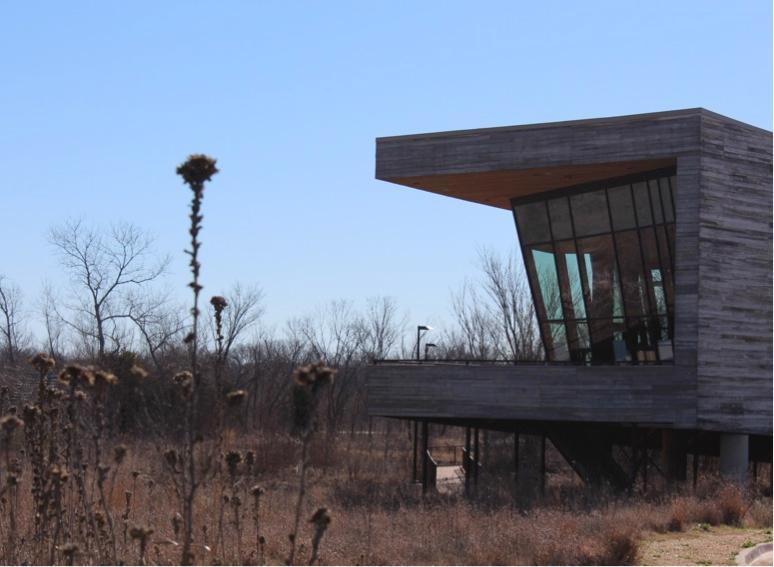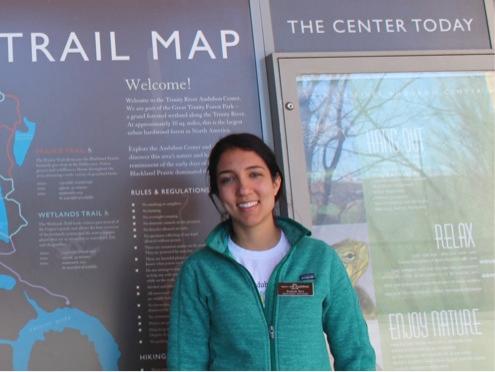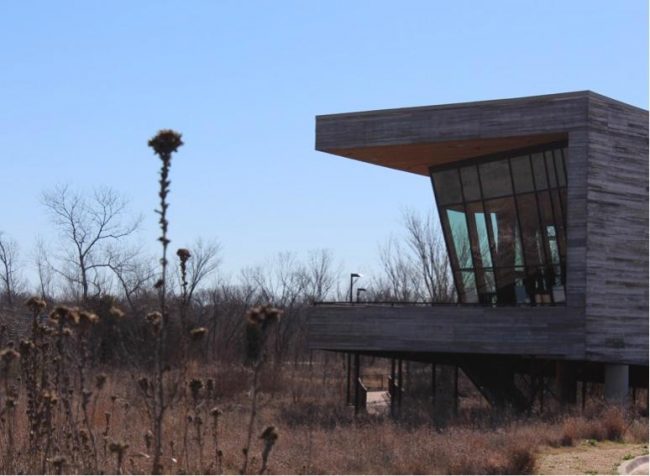
The Trinity River Audubon Center is surrounded by areas of open forest. ((SMU/Abril Murrillo))
For the first time, the child notices the sun bouncing off the common bird’s neck. The many colors of its feathers, the animal’s softness, and eye color are all new sensations for the child to absorb. A sound other than cooing stumps him until he notices it’s the bird’s heart beat.
“Pigeons are very good at navigating, actually the pigeons you see in your neighborhood might be the same ones all the time, no matter how far they fly, they can always return home,” explained Sahar Sea, education manager at the Trinity River Audubon Center.
The Trinity River Audubon Center, located near downtown Dallas, is dedicated to the conservation of native species from the area, especially birds.
When Sea was asked if she liked working with birds more than working with other animals, she simply smiled and said, “I do not work with birds, I work with people.”
Just like Sea, the rest of the staff at the Audubon Center agree that the main service they offer is directed to humans, not animals. In other words, conservation of the environment is their focus.
Fellow Education Manager Faizel Ismail offered his opinion on conservation while cleaning a frog tank. The big frog inside the tank swam forward as if wanting to hear more of the conversation.
“Conservation will fail if everybody isn’t part of it,” he said.
Ismail was born in South Africa, where he was used to seeing animals outside of cages. When he came to America, he worked for different zoos, like the Dallas Zoo, but found the Audubon Center more attractive because the animals were free.
Some young kids arrive at the Audubon Center expecting to see lions and giraffes and rhinos of which they have learn so much from TV shows such as “National Geographic”.
“Kids in Dallas, they don’t know much about animals from their own home. So here we teach them the amazing home they live in,” said Ismail. “Teaching a kid not to step on a caterpillar is as beneficial to the caterpillar as it is to the kid.”
In short, even the smallest creature or insignificant being has something to provide to the balance of the ecosystem.
Robert Beasley, an intern from El Centro College, admitted that he knew nothing about the Audubon Center before working there. The Trinity River Audubon Center is one of many centers scattered around the country that belong to the Audubon Organization.
When Beasley found out about the Audubon Center, he felt it was a perfect fit since he plans to major in childhood education and become a science teacher.
After working there for over two years, Beasley realized that kids need experience to learn. Some children arrive scared because they don’t know what they will encounter on the trail, but once they are done, their perspective of the wild changes.
“Not only kids arrive scared and leave with a big smile, but adults do that too,” he noticed.
Sea said that she does not see a difference in the excitement kids experience compared to some adults.
“They both get pretty excited, and competitive too.”
The Audubon Center has a program called Citizen Science where members of the public turn in their records of spotted birds to professional scientists to help them analyze bird patterns and any variations that might be happening in the environment. Michael McCorcle, a volunteer who lives near the Audubon Center, found the program particularly interesting.
“I actually found this place through my brother who was doing community service here and loved it. I haven’t had a chance to do the program, but I am planning to start soon,” McCorcle said.
The doors to the Trinity River Audubon Center aren’t always open, but Sea says the center keeps the front and back door of the pigeons house open all day and night.
“We know that they will come back here, to their home.”
The Trinity River Audubon Center is open Tuesday through Saturday, 9 a.m. to 4 p.m. For more information, visit the center online at trinityriver.audubon.org.

Education Manager Sahar Sea guides visitors through the Audubon Center.










